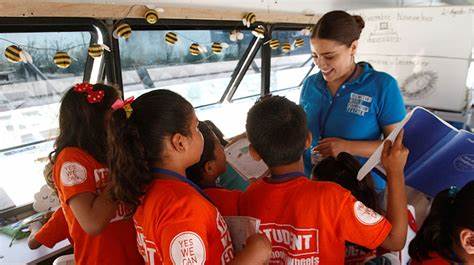A Bus Becomes a School for Migrant Children
The children sit close together with little space between them. They study their notes, books and papers at desks where once there had been passenger seats.
A teacher has hung their work from the storage area above their heads: colorful alphabet letters, and paintings.
The bus is in Tijuana, Mexico, just a few kilometers from the border with the United States. The bus is next to a migrant shelter. It offers a chance for Central American and Mexican children to attend school.
Several dozen students have taken part in the program since it began in July. For most of them, education was a distant dream in the weeks or months since their parents decided to leave their homes and travel north to seek refuge or a better life.
Estefania Rebellon is director of the program, called Yes We Can. She said it offers special education for children who may have low reading and writing abilities and struggle with social skills. The classes are bilingual, meaning they are taught both in Spanish and English.
The program seeks to provide a level of security too.
"These are children from very dangerous areas, where they have very big issues with trust," she said.
Recently, 22 people were killed in a shooting at a Walmart store in El Paso, Texas, including eight Mexicans. Police said the gunman was angry about immigration. But Rebellon said the violence that these students have seen in their home countries was likely worse.
She said it was upsetting that vulnerable people could not count on finding safety in the United States.
Rebellon, who also works as an actress in Los Angeles, said she knows what it is like to feel lost as a migrant child. When she was 10 years old, she moved to Miami, Florida, from Colombia, where her parents had received death threats.
School became her refuge, or safe place.

When she saw large groups of Central American migrants arriving in Tijuana late last year, she launched a school program for children in at a large shelter.
She got the idea to use an old bus as a school from the "tiny home movement”—that supports living in small homes.
Rebellon's bus used to fit 55 people - but with the insides removed, it now seats 80 children.
The bus has welcomed 37 students ages five to 12 since the program opened. It will take in another 20 children in the coming weeks. Yes We Can will also launch a program for teenagers in tents outside, Rebellon said.
The three teachers are accredited in Mexico. They have experience working with displaced children in Latin America.
Yes We Can is working to bring on a fourth teacher who speaks two native languages, in addition to Spanish and English.
Most of the children are from families that are in Tijuana for weeks or months. They are waiting to seek asylum in the United States.
They come from Honduras, El Salvador and Guatemala. They also come from the Mexican cities of Guerrero, Michoacan and Leon, where people often fear getting caught in gunfire between illegal drug groups.
Rebellon said parents from those cities have told her that teachers often refuse to show up at school because they fear getting killed or kidnapped. Some children have missed school for several months.
With more money, Rebellon said she would like to expand to other border cities with growing migrant populations.
"We can be in a bus, in a house, in a boat," she said. "It's more about what we teach the children."
I’m Anne Ball.












